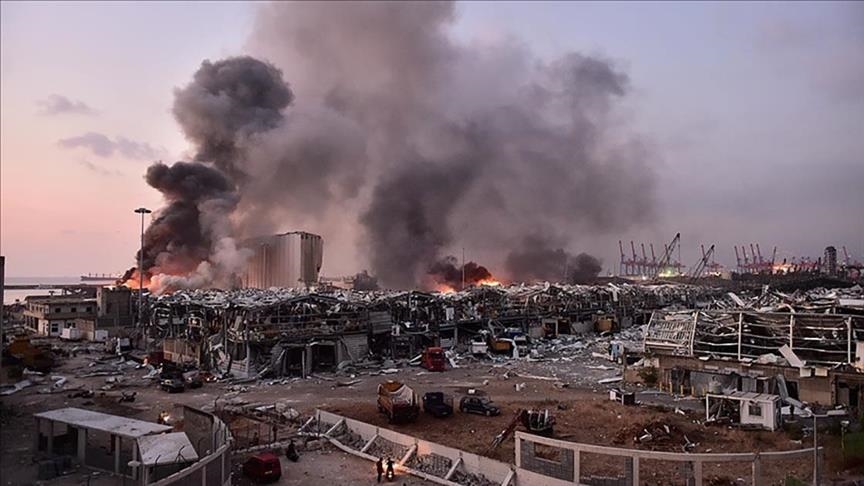ANKARA
Lebanon marks Thursday two years since a massive explosion ripped through Beirut port, leaving a mass trail of destruction and paralyzing large parts of the grieving city.
The blast, one of the largest non-nuclear explosions in history, killed over 200 people, injured thousands and weakened the country’s already fragile economy.
A day after the destructive explosion, the Lebanese government opened an investigation into the incident, putting the port’s administrative staff under house arrest.
Almost a week after the blast, Lebanese lawyer Fadi Sawwan was appointed as a judge in charge of the investigation, before being sacked in Feb. 2021 by the court of cassation following lawsuits filed against him.
Tariq Bitar was given the confidence to replace Sawwan but his nomination was faced by backlash from the governing parties, mainly Hezbollah and the Amal Movement.
In Oct. 2021, Bitar again drew further attention after a court dismissed a complaint against him and allowed him to continue leading investigation into the blast. Protests calling for his removal turned into violence, leaving seven people dead following clashes in Beirut’s Tayouneh district.
For almost two years and until this very moment, families of the victims of the port blast are still organizing protests to demand accountability for those involved.
However, the investigation has yet to reach any outcome due to pleas filed by Lebanese MPs and former ministers against Bitar, which caused to put the investigation on hold for months.
Lack of political will
Lebanese analyst Moufeed Mustafa cites lack of political will and constant interference by the political elite in Lebanon’s judicial affairs for failing to bring those responsible to accountability.
“The judicial system in the country is not only weak but subordinate to the political elite who don’t respect judiciary and ignore its demands,” Mustafa told Anadolu Agency.
He noted that former ministers and MPs (close to Hezbollah and the Amal Movement) hinder any cooperation with the judiciary in investigation into the blast.
“We have the examples of Ali Hassan Khalil, a former minister of finance, Nihad al-Mashnouq, the former minister of interior and Joseph Fenianos, the former minister of public works and Ghazi Zuaitir, a former MP, who both refused to be questioned citing their immunity,” Mustafa said.
Mustafa also referred to Hezbollah’s repeated attempts to sack Judge Bitar, causing deadly clashes between Hezbollah activists and gunmen believed to be loyal to the Lebanese Forces Party in Beirut’s Tayouneh district.
“These clashes and repeated interference in the judiciary led to halting and even postponing the investigation into the blast,” he added.
For Lebanese commentator Fadi Samaan, Hezbollah and Amal Movement embarked on a campaign to obstruct the investigation since its very beginning.
“Dozens of judicial procedures were launched against Judge Bitar by political defendants. In the period between September 22, 2021 and June 2, 2022, some 34 pleas were filed against him to impede his investigation,” Samaan said in an opinion for Raseef22 media network.
He opined that by obstructing the investigation into the Beirut port blast, the political authority, headed by Hezbollah and the Amal Movement, “sent a clear message to the Lebanese that the judiciary and security services have no authority over the country anymore, and that impeding the law can be done via an oral threat, a pressuring visit to the Palace of Justice, or an armed clash.”
The capital Beirut is expected to see mass protests on Thursday called by Lebanese activists to mark the second anniversary of the port explosion and to demand justice for the victims.

